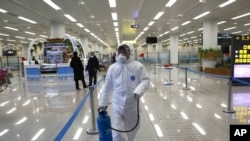A vast transportation lockdown meant to contain the spread of a new coronavirus in central China is complicating the already grueling journey of North Korean refugees, according to two sources who help arrange North Korean defector trips.
Chinese authorities have implemented what one World Health Organization official called an “unprecedented” lockdown to contain the viral outbreak, which has infected over 24,000 people and killed nearly 500 worldwide.
China has closed public transportation links, restricted access to major highways, and imposed strict ID and temperature checks - effectively placing tens of millions under quarantine in an expanding circle around Hubei province, where the outbreak began.
The lockdown is disrupting the main path through which North Koreans escape, forcing at least dozens of refugees to indefinitely pause their journeys, and leaving them vulnerable in a country that has long sent them back home to certain punishment. “
The road closures have blocked the route. It has all stopped -- I asked them not to come through that area for now,” a South Korea-based broker who helps organize North Korean defector journeys through China, told VOA.
Dangerous journey
After fleeing their homes, most North Korean refugees make their way down through China and then onto Southeast Asian countries, including Laos and Thailand, before ending up in South Korea. The journey, which can take months or longer and is thousands of kilometers long, often involves trekking by foot over mountains and using tiny boats to cross rivers.
The China portion of the trip is especially risky, since North Korean refugees are forced to use fake ID cards, according to the Seoul-based broker, who himself defected to South Korea in 2004. “
But with China now trying to control everyone’s movements, it’s just too dangerous,” says the man, who did not want to publish his name because of the sensitivity of his work.
Kim Seung-eun, a pastor at Seoul’s Caleb Mission Church, which also helps defectors escape, estimates that about 40 North Koreans are trapped at various locations in China, unable to move onward because of the lockdown.
Tens of thousands of North Koreans are at various stages of transit through China or have decided to settle there illegally, according to estimates by rights groups.
If China’s virus lockdown expands to include house inspections, Pastor Kim warns, North Korean refugees could be in danger.
As North Korea's most important international backer, China refuses to grant North Koreans refugee status. It instead returns them to North Korea, where they could face torture or long prison sentences.
Loophole?
Earlier this week, Pastor Kim told VOA’s Korea Service that he heard North Korea has temporarily stopped demanding that China repatriate defectors, out of concern they may bring the virus into North Korea.
It is unclear what would happen to North Korean refugees who are discovered by Chinese authorities during the lockdown.
Teodora Gyupchanova, a researcher at the Database Center for North Korean Human Rights in Seoul, says it is possible that the virus-related travel restrictions could create loopholes that defectors and brokers could exploit.
That is especially true if Chinese authorities prioritize potential coronavirus cases and focus on monitoring established transportation routes rather than clandestine ones, Gyupchanova says.“
People in this line of work are quite inventive, so I am sure that backup routes will soon be found,” she says.
Fewer defections
The number of North Korean defectors to South Korea reached an 18-year low in 2019, as surveillance and security expanded on both sides of the North Korea-China border.
That number could drop even further in 2020, depending on how long China’s coronavirus lockdown lasts.
A total of 1,047 North Korean defectors arrived in South Korea in 2019, according to data released last month by South Korea’s Ministry of Unification. That is down from a peak in 2009, when 2,914 defectors made it to the South.
The number of defectors arriving in South Korea began to decline after North Korean leader Kim Jong Un took power following the death of his father in late 2011.
But much of the security buildup has occurred on the Chinese side, with new surveillance methods, including facial recognition technology, making the journey especially tricky.
Lee Juhyun contributed to this report.




